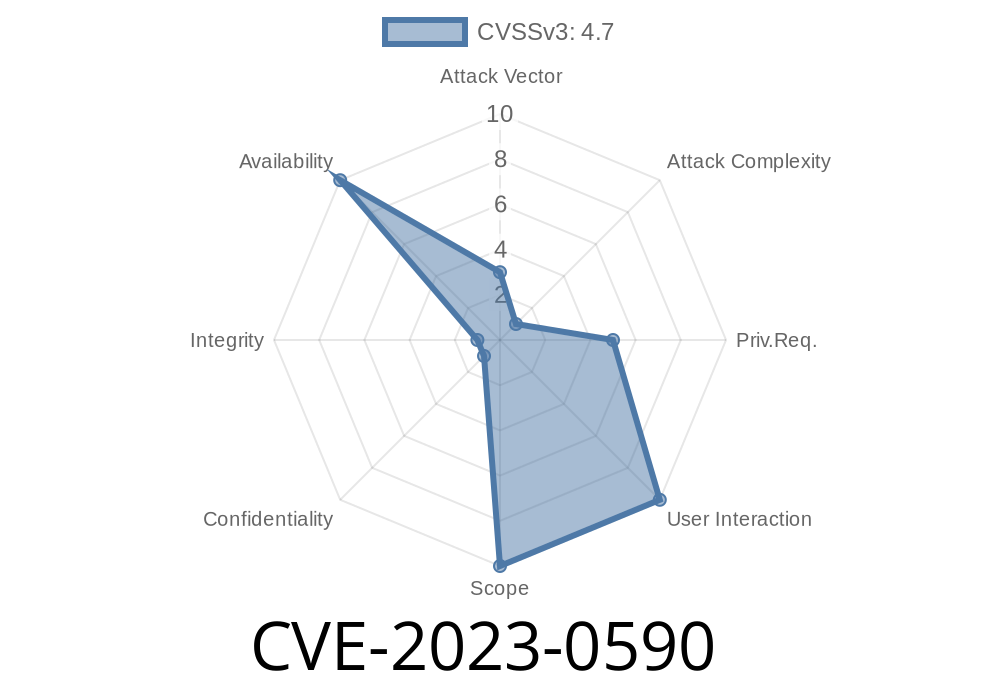In recent days, a critical security flaw has been discovered in the Linux Kernel, identified as CVE-2023-0590. This use-after-free vulnerability resides in the qdisc_graft function within net/sched/sch_api.c and has the potential to cause denial of service (DoS) issues. The flaw is the result of a race condition, and if the patch ebda44da44f6 ("net: sched: fix race condition in qdisc_graft()") has not been applied, your Linux Kernel may be vulnerable.
In this post, we will dive deep into the issue, providing code snippets, links to original references, and exploit details to help you understand and mitigate this vulnerability.
Background on the Flaw
A use-after-free vulnerability arises when a program continues to utilize memory after it has been freed. This can lead to a variety of serious consequences, potentially allowing attackers to execute arbitrary code or cause a denial of service (DoS).
The Linux Kernel flaw of concern, CVE-2023-0590, occurs within the qdisc_graft function. Qdisc (Queueing Disciplines for Bandwidth Management) is responsible for managing network traffic in the Linux Kernel. The qdisc_graft function is the one that handles replacing a qdisc with a new one.
This vulnerability is caused by a race condition that arises when using the "tc" (traffic control) command to change qdiscs. This command allows Linux administrators to manipulate the network packet queuing of the kernel. The race condition leads to the possibility of use-after-free, creating the potential for a denial of service (DoS) attack.
Exploit Details
To exploit this vulnerability, an attacker would need local access to the targeted system. The attacker could then employ a crafted sequence of system calls or processes, manipulating the traffic control command in such a way as to trigger the use-after-free vulnerability.
Here is a code snippet illustrating the vulnerable portion of the qdisc_graft function
void qdisc_graft(struct net_device *dev, struct Qdisc *parent,
struct Qdisc *new, struct Qdisc *old)
{
.
.
.
qdisc_tree_reduce_backlog(old, old->q.qlen, old->qstats.backlog);
qdisc_reset(old);
// Race condition can occur here
qdisc_put(old);
qdisc_tree_flush_backlog(new);
}
The race condition can occur when a parallel call to the qdisc_graft function is executed after the "qdisc_put" call, but before the "qdisc_tree_flush_backlog" call. This might lead to a use-after-free scenario when the old qdisc is still being used.
Original References & Further Reading
The following links provide additional details and explanations about the vulnerability and the patch that addresses it:
1. Linux Kernel Git Commit - Patch: https://git.kernel.org/pub/scm/linux/kernel/git/torvalds/linux.git/commit/?id=ebda44da44f6eafbb79dda84612715560122c4bd
2. CVE Details: https://nvd.nist.gov/vuln/detail/CVE-2023-0590
3. Linux Kernel Mailing List: https://lkml.org/lkml/2023/3/27/165
Mitigation & Next Steps
To protect your Linux Kernel from this vulnerability, ensure that you have applied the patch ebda44da44f6 ("net: sched: fix race condition in qdisc_graft()"). Check your current kernel version and update it if necessary. Always keep your system and software updated with the latest security patches and follow best practices for maintaining a secure system.
In conclusion, it is essential to be aware of and mitigate potential vulnerabilities in the Linux Kernel. By staying informed and taking proactive steps to protect your system, you can minimize the risk of exploitation by CVE-2023-0590 and similar security issues.
Timeline
Published on: 03/23/2023 21:15:00 UTC
Last modified on: 03/28/2023 16:24:00 UTC
